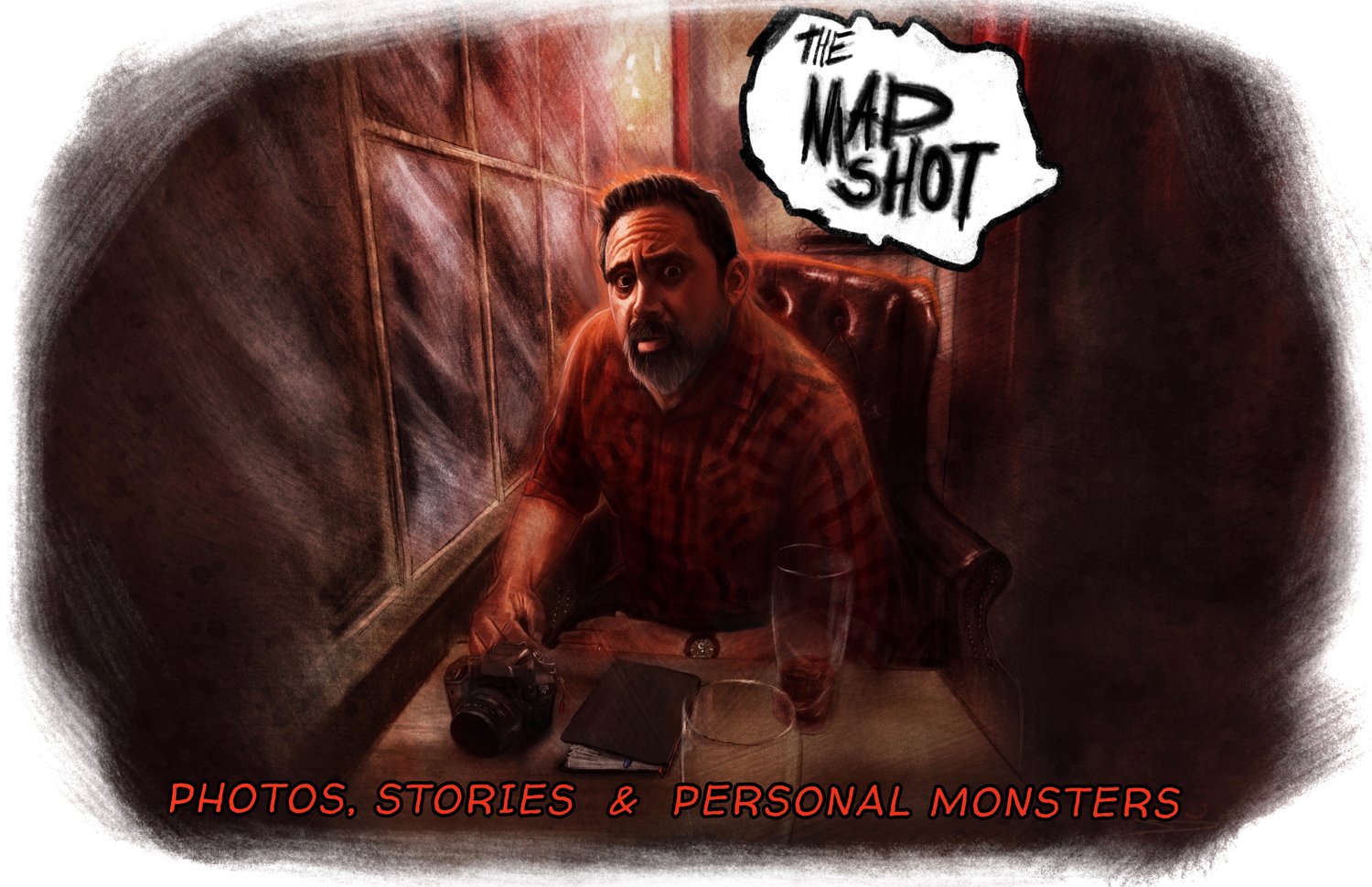The Changes: Part 1
The floor trembles beneath us as a team of nurses scatter in and out of the room. A whiteboard, carved in black ink, shows the state of our affairs and I'm suddenly reminded that I've been here before. The date is April 13th, 2014, and my wife Josephine and I are preparing to welcome our second child, Joseph Michael, to the world. In the foxhole where we gathered three years prior to welcome his older brother Samuel, we unite once again, striking our fists on the pavement, a brash signature embracing the uncertainty ahead. As we do this, a question looms; What the fuck were we thinking? Plans often have a funny way of evading memory once the intended goal is achieved.
Did we really just create another human being for which we would be responsible the rest of our lives? It's a question every parent asks themselves. Or just one I hope they do so we don't feel so alone. I marvel at this tiny creature as he opens his eyes at me, adapting to every sliver of light and sound and oblivious to the possibility that I could very well fuck this all up. When you have a child, these are the realities you face. You ready plans that will forever alter your lives to which your children have no knowledge or preview.
You can't expect gratitude, or some shitty Safeway Hallmark card expressing their admiration for all your hard work. All you can do is celebrate that they're still around after that first year, all while under your strict management. The shit and piss you collect daily form the steps that advance you to the next stage of the game, with every stride you take being only for the betterment of your children. Some hurdles, you'll see coming. There are others, though, that evolve in secret, far beyond your comprehension. And when that happens, you’ll curse everything for which the world around you stands.
Last November, my wife and I noticed something unusual about an area of our then eight month old son Joseph's body. His testicles looked swollen. Where one would expect to see a normal body part, a hardened mound of flesh appeared. While it didn't seem to bother him, regardless of whatever crazy position he found himself in, we decided to get it checked out. We scheduled an appointment with his pediatrician, various scenarios entering like shrapnel in our brains. As I waited in the car with our three year old son, Sammy, a decision only a toddler's tantrum could inspire, not to mention my coming down with the flu earlier that week, my wife took our baby in to get examined.
As Sammy and I waited, I half listened to an interview by NPR's Terry Gross of Bay Area musician John Vanderslice, which surrounded the man's music career before founding the recording studio Tiny Telephone in San Francisco. Sammy spoke along in tandem, occasionally asking me what I was listening to. I couldn't answer him, though. The ability to speak escaped me, a temporary abandonment of fatherhood sparked by sickness and emotional unease. For that brief moment, I was officially just a babysitter. As my wife returned to the car, I sprang from my seat to meet her. I could see the tracks lining her cheeks and the cloud of red smothering her eyes.
I counted six total seconds before any words exited her mouth where I imagined the worst possible outcome. Was my son an alien whose twin brain was housed in his scrotum, secretly developing an evil plan to overtake the world and turn all of mankind into mindless slaves? Unfortunately, no. The initial conclusion was that it was a hernia, the removal of which I was told had already been scheduled for later that afternoon. We were immediately sent across the street to Lucile Packard to meet with the surgeon. After a brief wait, we were taken to a room in back where a man I had never met would illustrate how he would go about taking a knife to our son.
Upon analyzing the area, the surgeon began to entertain other potential causes of the swelling, skeptical whether or not a hernia was in the cards. Following a variety of different scenarios, the doctor shuffled the deck and dealt a new hand on the table: a tumor. I never imagined a single word could be so terrifying. We were sent back to Good Sam so Joseph could undergo an ultrasound. We watched as the technician coated his skin with that weird gel, his young mind struggling to grasp the situation. He cried helplessly. We restrained him as gently as we could and felt the strength in his tiny limbs slowly begin to flourish.
After an excruciating 30 minutes, we were sent home through what felt like a black hole to face the weekend-long wait for the results. We just wanted answers. Unfortunately for us, they were to questions we hadn't prepared ourselves to ask. We took our son home that evening where we watched him laugh, smile, and remain completely unaware, as we were of the news to come.
Around 1pm, the following Monday, I received a call from my wife. Watching the screen on my phone, I began to think about the trivial nature of modern communication and just how strange actual phone calls seem nowadays. With text messaging, emojis and overall social media having commanded our lives, how we connect with one another has changed dramatically. And even though my wife's call was expected, receiving it at work on a Monday afternoon just felt odd.
I immediately left the store to take it. That I even bothered to answer with a typical "hello" I suppose was inspired by some desperate attempt to arouse a normal conversation, though something I knew this particular one would be far from. I was greeted with silence at first. I could hear her on the other end arranging her words, tears already on the ledge ready to jump. Through the jagged, almost breathless delivery in her voice, three words she let out were clear:
"… It's a tumor."
I tried to process this, briefly forgetting the person on the phone was the boy's mother, not a doctor calling to communicate our options, but the woman who carried him for nine months, a bond unlike anything I will ever know. This was a difficult thing for her to have to tell me.
I tried to remain calm, something I knew she would be dependent on. What I wanted to do was scream at the gates and curse every religion known to man. But that wasn't an option. From the blackness of where I stood, under a piercing skylight in the mall, I assured her that everything was going to be okay. After we hung up, I called my boss to inform her of the news. There, standing beside a wall-sized mural of a young, beautifully hip couple lining the side of a Michael Kors retail store, I lost my shit completely. A tumor, the origin of which we were completely fucking clueless, had invaded my son's body.
There was no army strong enough to defend against the onslaught of fear and worry that aimed to shatter every optimistic bone in my body. The surgery was scheduled for Thursday, December 11th. That morning, we woke our son up and drove him to Lucile Packard Children's Hospital at Stanford in Palo Alto. After a brief consultation, we were directed to the pre-op room. We watched Finding Nemo on the small TV above his bed and for the briefest of moments, things felt normal. But we weren't parents seeing our son off on his first day of school, or taking him on a carnival ride as he enjoyed his first taste of ice cream. Among all the "firsts" we were anticipating as parents, sending him off to endure his first major surgery before turning nine months old was not one of them.
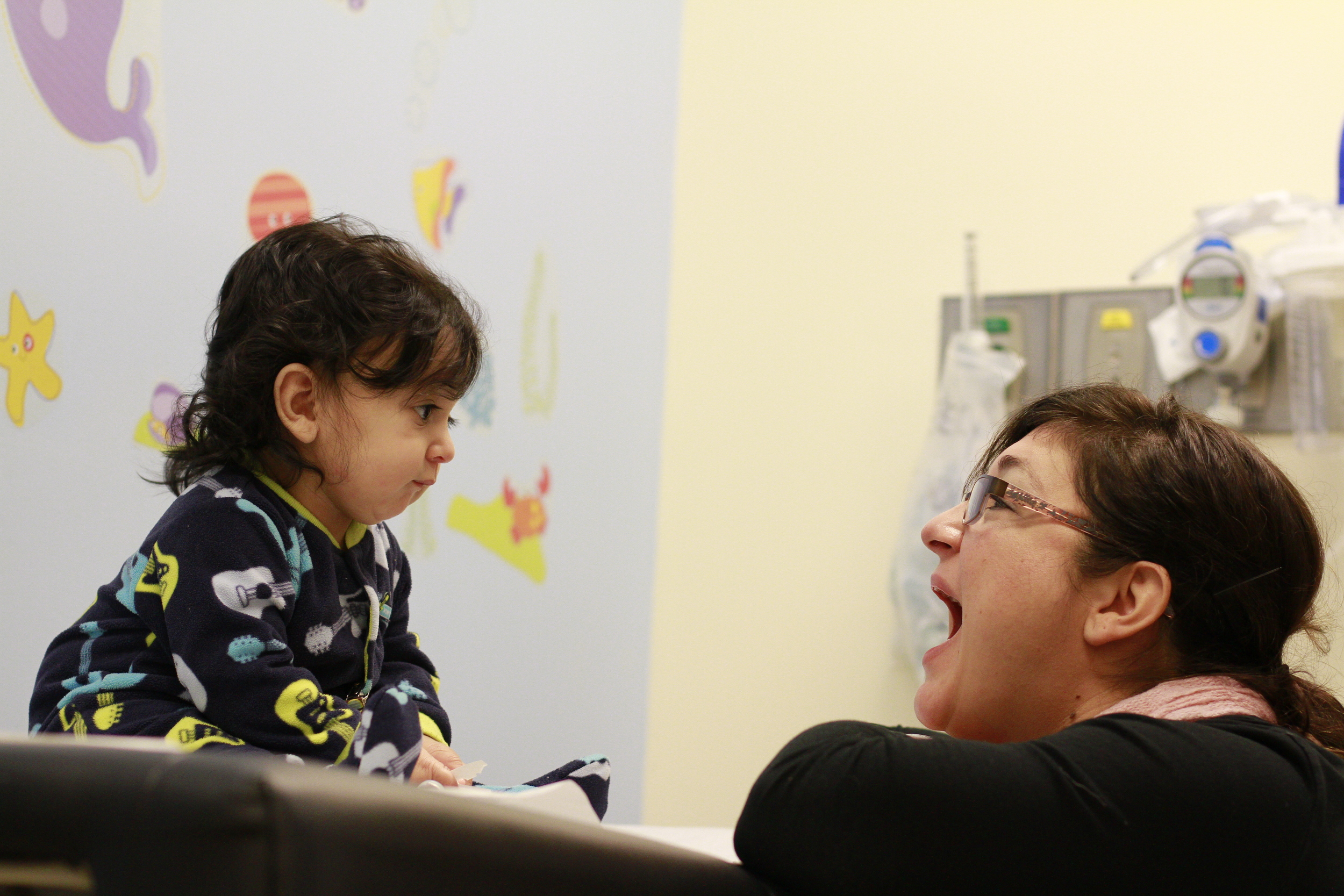
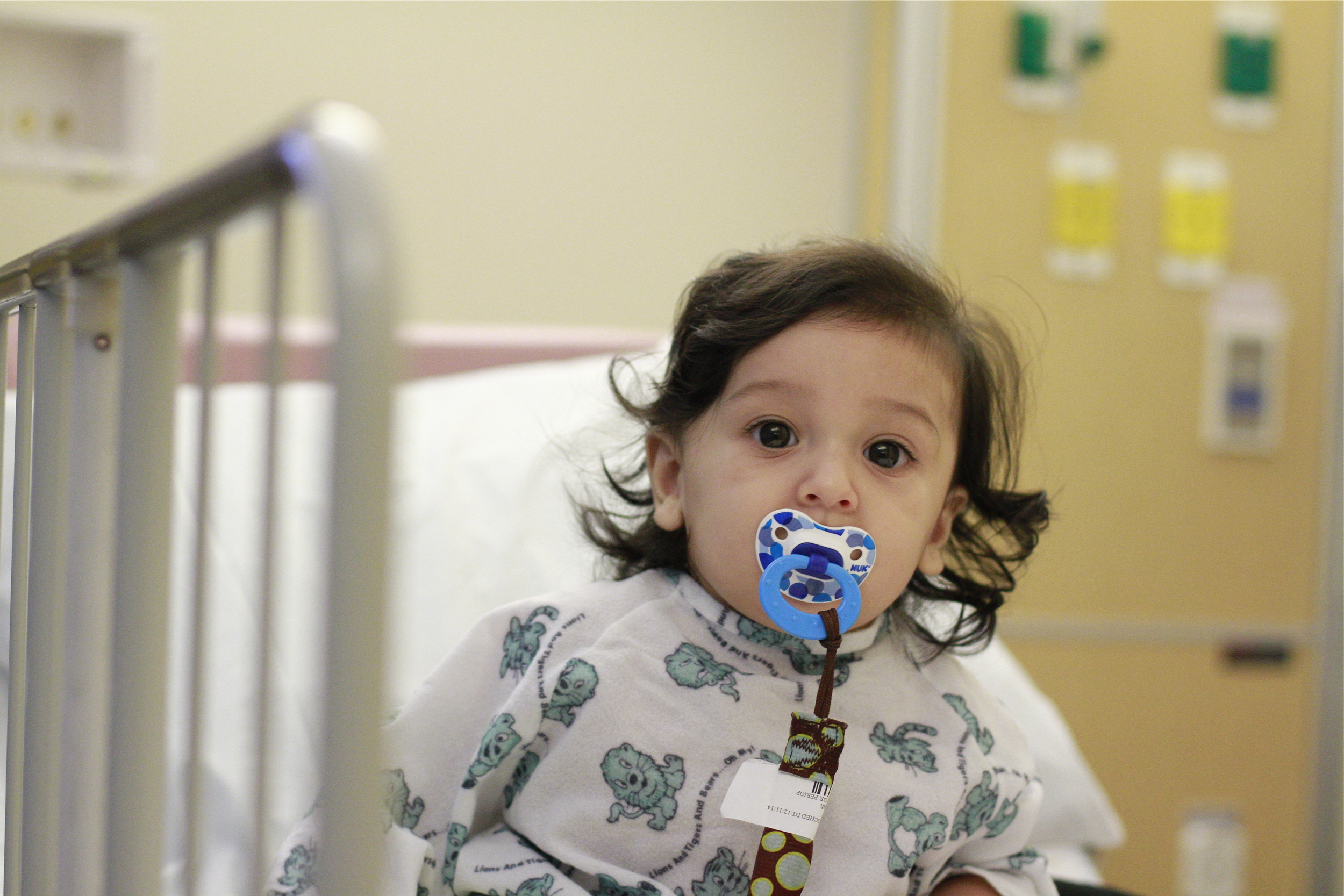
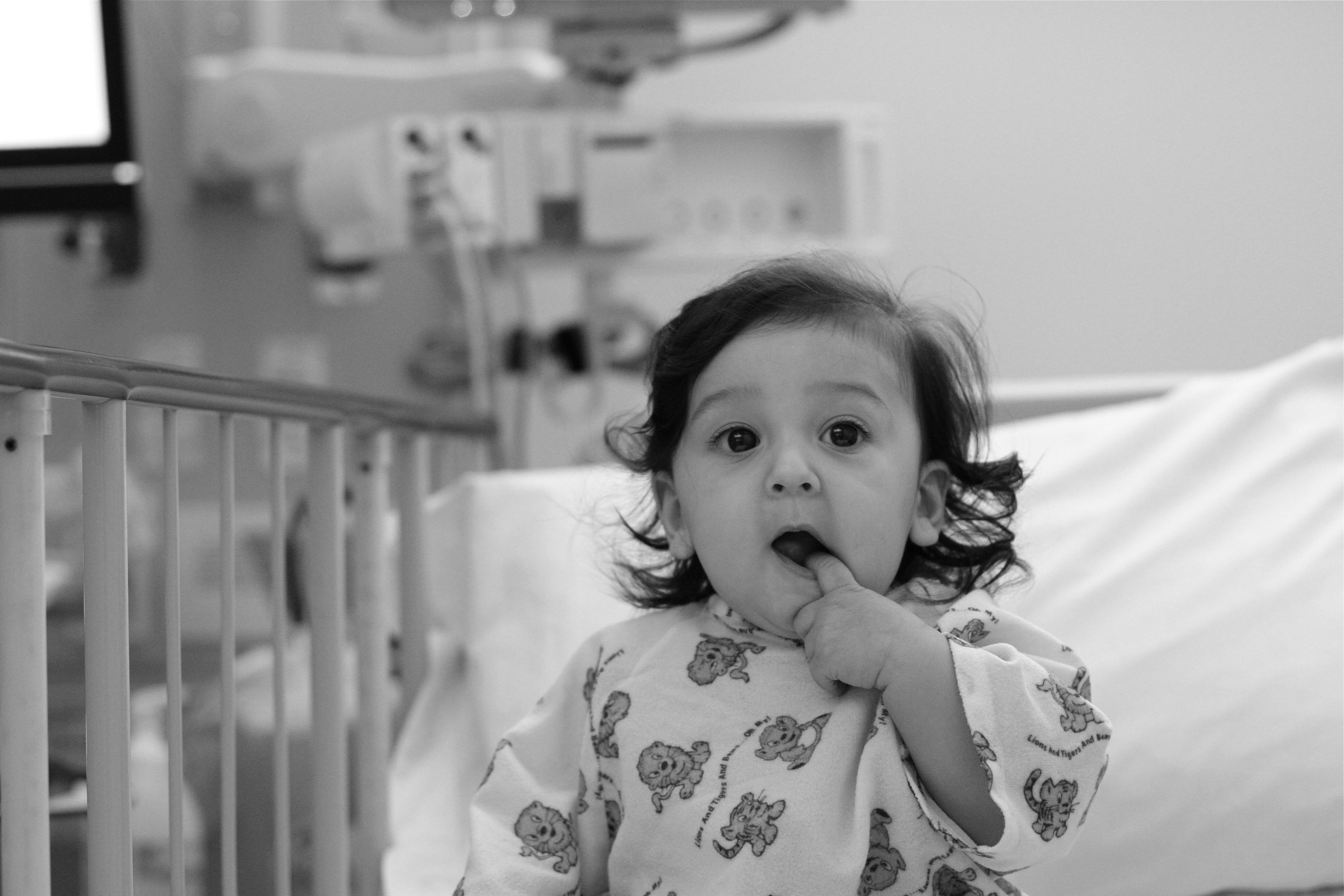
We kissed him goodbye and watched the nurse cart him away. During the mere seconds it took for them to reach the exit, I reflected on our normal morning routine: waking up to the bed shaking as our son Sammy wedged in between us, listening to the short chirps Joseph would make when playing in his crib at the beginning of his day, and preparing their cereal while brewing my morning coffee. As his bed neared the door, these things began to feel more and more out of reach.
On the contrary, I knew these daily rituals would return. I just didn't know how I would feel about it when they did. You stay positive for your children, but not always for yourself. Joseph looked adorable in his tiny gown, shooting smiles at all the nurses. This gave us comfort. Nothing was different for him. It was just new, an experience he'll never remember as he moved further out of sight. And like that, he was gone.
Family swelled back in the waiting room. As we had some time, Josephine and I visited the cafeteria to refuel. We were told that after the tumor was removed, an examination would follow.
As I slid my tray of turkey-smothered gravy along the belt, I saw my mother-in-law running toward the cafeteria's main entrance. We abandoned our trays and immediately rushed over, only to be met by the doctor who emerged behind her in the hallway. He took us aside, and informed us that the operation had gone well and tumor had been successfully removed. A smile began to form, but felt somewhat isolated. Weak. I waited for the "but.", a word I've heard several times before...
"I love you too, but..."
"Your screenplay was good, but..."
"The sex was decent, but..."
I wasn't prepared for the one that followed. As I clutched my wife's hand, the wave of the doctor's voice crashed, submerging us in our new reality. The tumor he and his surgical team had just removed from our son's body was, in fact, malignant, and with our consent, would require the removal of his right testicle in order to avoid any possible spread of the cancer. I didn't want to say the word at first. And I didn't, for weeks. Five minutes ago, we were stacking food on our trays, a very clear number of steps ahead of us. Now, I couldn't see where they ended. We surrendered our consent and for the next 20 minutes were bombarded by family.
The support was astounding. But I felt helpless. I wanted to know that I could help my children through anything and provide the guidance they needed along the way, on how to treat their friends and know how to identify the true ones, how to save money, or even drive a stick shift, something with which I have very little experience. I could teach them these things and more, except what it feels like to be diagnosed with a type of cancer called rhabdomyosarcoma.
This is what our son had. And the year long worth of treatments that he would be forced to endure is what we had to look forward to. The photos below were taken during his twelfth week of treatment. I'll admit, the one true silver lining that's practically guided us throughout this entire ordeal is how wonderfully he's coped. His treatments began last December and he's soldiered along ever since. His smile and laugh are infectious and remain as continuous as ever.
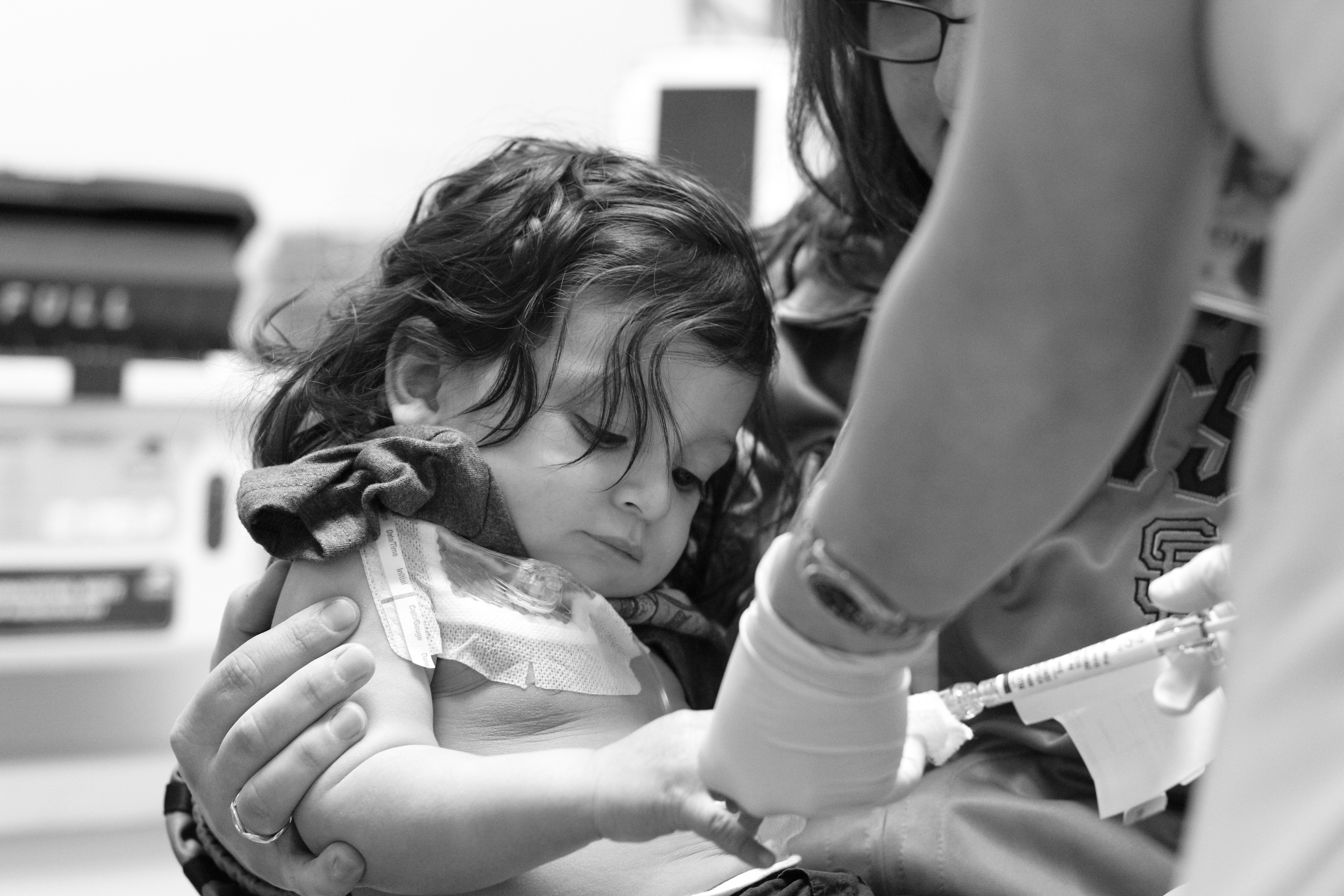
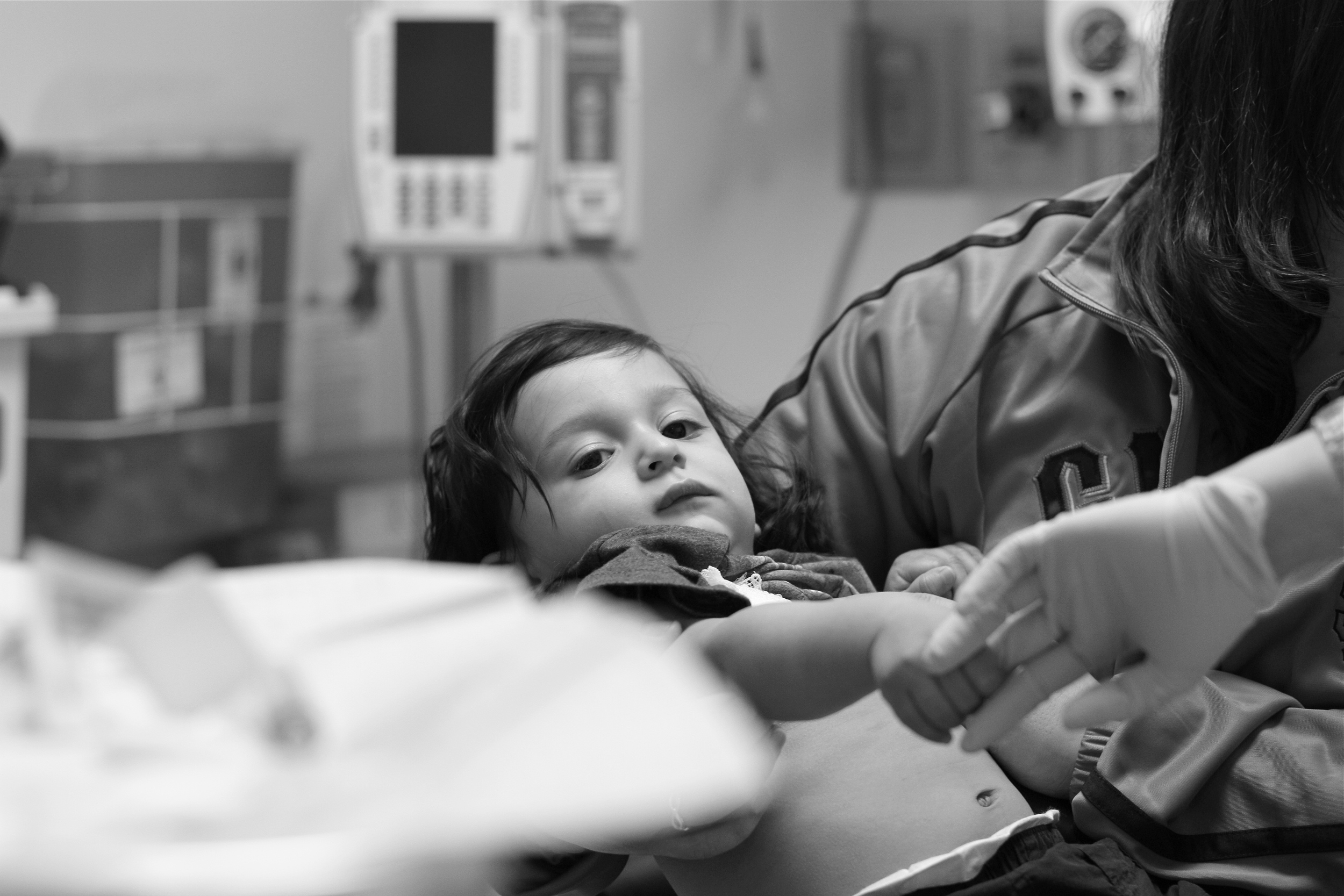
We visit Stanford's Lucile Packard Children's Hospital every Wednesday, the waiting room comprised of the personal struggles of so many other families, a group of which my wife and I are now members. This is our reality. One that we continue to face until the end of the road can be viewed from solid ground, and not the rooftop that's often required. We continue to be hopeful that these remaining treatments will be his last.
Before chemo began, Joseph's oncologist listed the many side effects that could befall him. One of them, obviously, was hair loss which she told us could occur within ten days of his initial treatments. At the time of this post, he'll be going on his 36th week and has needed two haircuts. Whenever his oncologist sees him, she still can't believe it. With no answer given, we just decided to blame damn good hair genes.
Joseph in downtown Santa Cruz sticking his tongue out for no apparent reason. July, 2015.
And now we’re here, with our son facing his final three months of treatment and the excitement this eventual milestone gives me. It seems so close and within reach. My hand aches from the grasp of something almost attainable. But I know a shadow will always be there, behind the grip, when I hold him close to my chest and kiss him goodnight, a shadow that can only be caused by a lingering anxiety. One that will ride with us in the car and sit at the dinner table while we eat. A shadow I will always see. But it won't be that way forever. Fear, doubt, just like anything, can be impaired. The hope of one thing can permanently cripple the fear of another. And that may just be enough.
